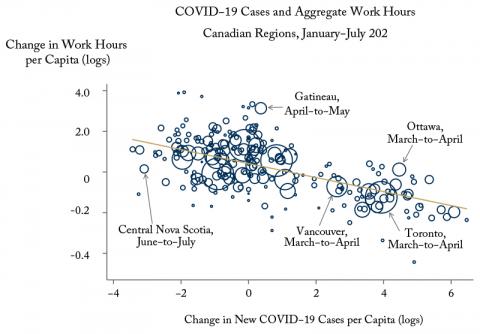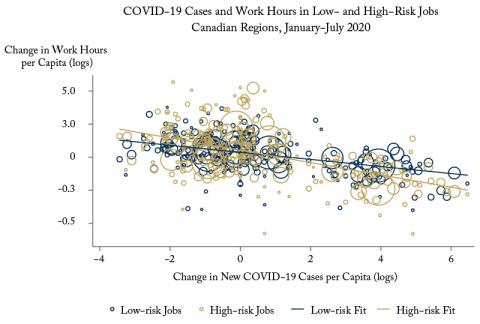From: Joel Blit, Chuanmo Jin and Mikal Skuterud
To: Canadians Concerned About the Economy
Date: August 21, 2020
Re: Re-opening and Re-closing the Economy Strategically
In the relative calm between waves of COVID-19, policymakers are facing pressure to shift their focus from efforts to control the virus, towards ways to revive the economy. But the biggest determinant of our economic recovery will be our ability to contain future waves of the virus.
For the past several months, we have tracked the relationship between new COVID-19 cases and total (aggregate) hours of employment in Canada’s regions. The results of our analysis reveal a clear tendency for work hours to decline, through both reduced workweeks and job losses, when case numbers increase.
As shown in Figure 1, which combines six months (February to July 2020) of data for 65 regions spanning all 10 provinces, there is a strong negative relationship between the change in the number of COVID-19 cases between one month and the next, and the subsequent month-to-month change in aggregate hours worked.
Figure 1
Note: COVID−19 cases are cumulative new cases in 4 weeks prior to hours of work. Marker size proportional to population. Fitted line from a weighted least squares regression.
Source: Labour Force Survey (RTRA) and https://github.com/ishaberry/Covid19Canada/.
While one should always be cautious in inferring causal relationships from correlations, the relationship appears largely driven by the large decline in hours worked between March and April following the initial surge in cases and government-imposed shutdowns. However, a weak negative relationship is also evident when comparing Canadian regions in more recent months, which likely reflects individuals choosing to reduce work activity when health risks are increasing.
These results point to the need to continue prioritizing measures to contain COVID-19 infection rates, even while cases are low. One strategy for sustaining economic activity while managing infection rates is to target sectors and occupations where virus contagion risks are high. The Vancouver School of Economics (VSE) has developed an invaluable tool enabling policymakers to evaluate risks based on the extent to which an occupation requires close physical proximity to other individuals, among other measures.
Using VSE’s proximity data as a proxy for the relative risk of infection associated with different occupations, we find that high-risk occupations have experienced a larger average decline in hours following a rise in cases relative to jobs requiring lower physical proximity (see Figure 2.) However, the difference is remarkably small and non-existent when we restrict attention to regions in more recent months. This suggests that there is potential to be more strategic in regulating shutdowns.
Figure 2
When the pandemic reached Canada in March, we were ill-prepared, with little equipment and no clear plan. We took the unprecedented step to shut down much of our economy. When the next wave arrives, we must adopt a more strategic response that takes into account the health risks associated with different occupations, in addition to their economic, social, and security benefits. A more selective plan would call for activities that present a greater risk to be shut down first in response to local outbreaks.
Moreover, our plan must be proactive and not reactive. We are plotting a difficult path that must balance risks to health on the one hand and economic recovery and individual freedom on the other. To chart the best course forward we need a steady hand at the tiller, that uses the best available evidence and is forward looking. Any adjustments we make today will not be felt for weeks. Even in times of low infection we must make judicious choices, because opening risky activities, like indoor restaurants and bars, today could mean that our children can’t attend school tomorrow.
Joel Blit is Associate Professor of Economics at the University of Waterloo, where Chuanmo Jin is a Master’s of Economics student and Mikal Skuterud is a Professor of Economics.
To send a comment or leave feedback, email us at blog@cdhowe.org.
The views expressed here are those of the authors. The C.D. Howe Institute does not take corporate positions on policy matters.







